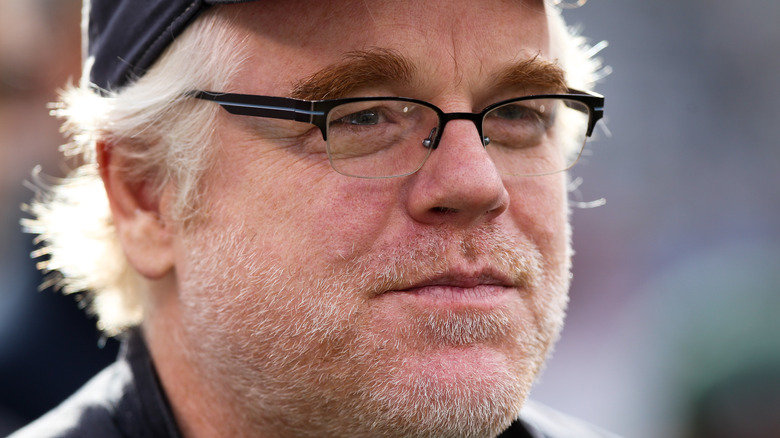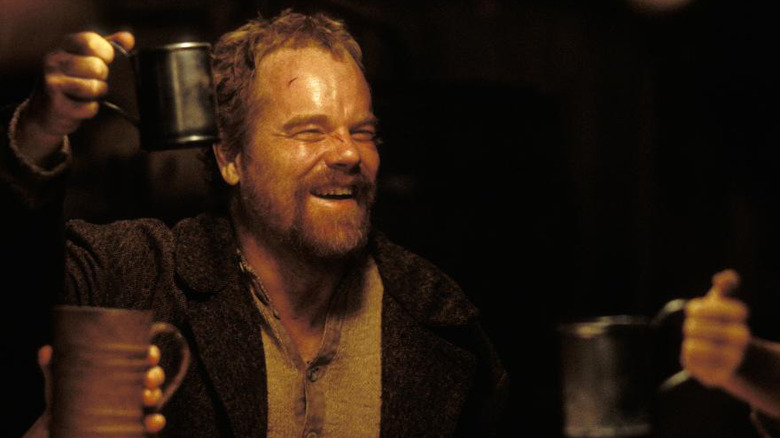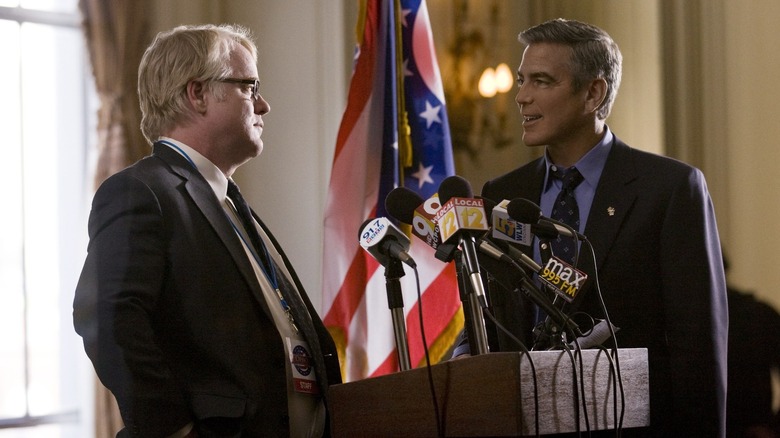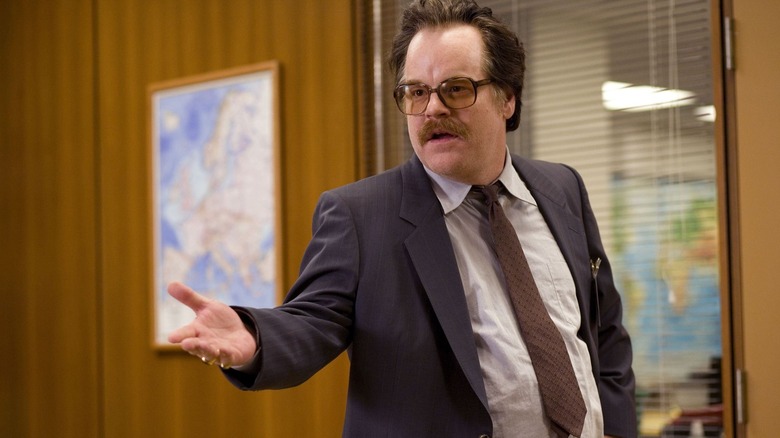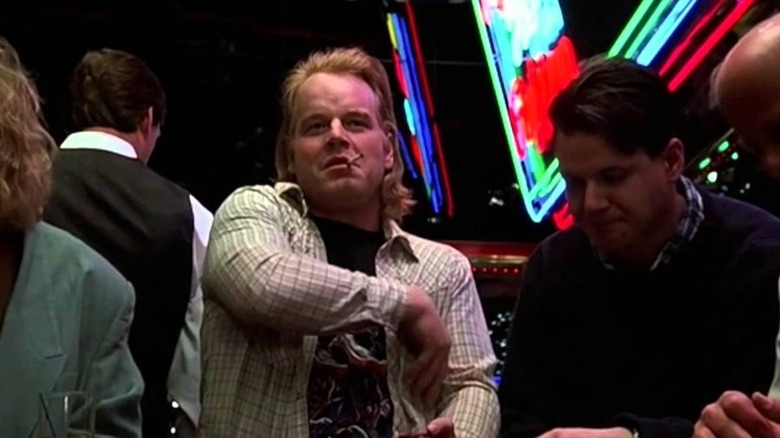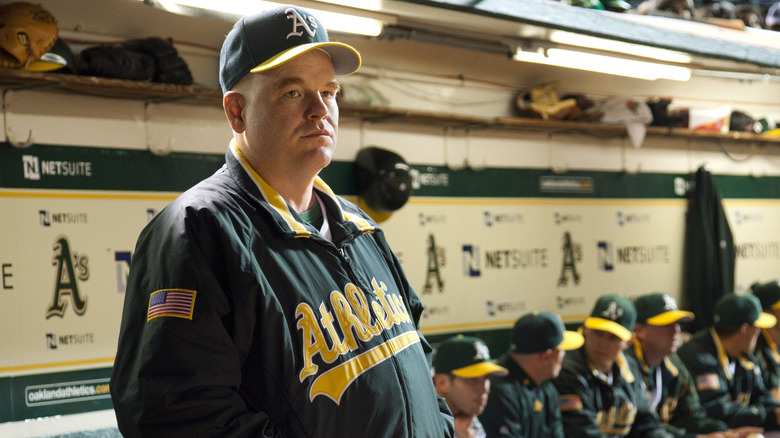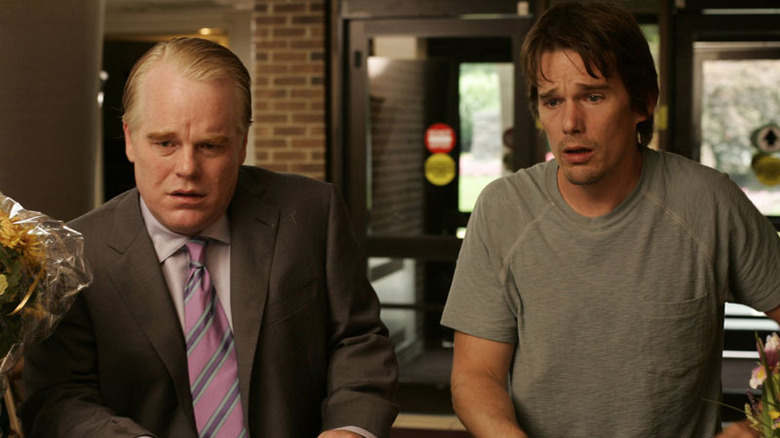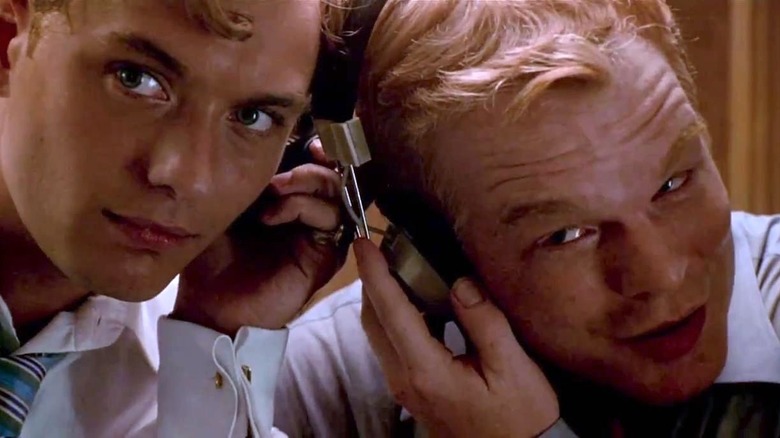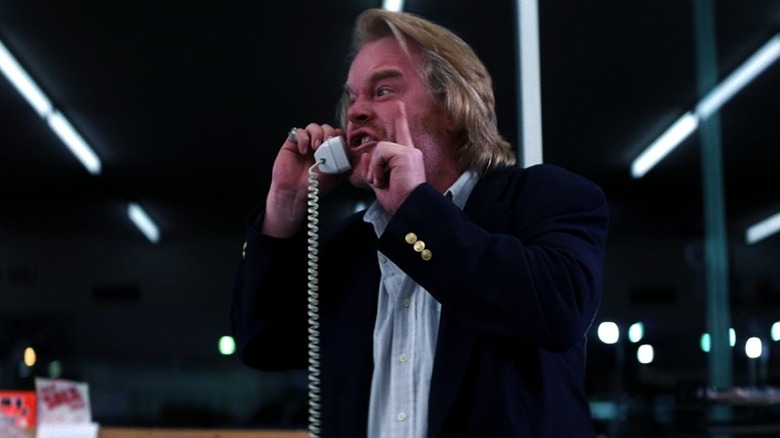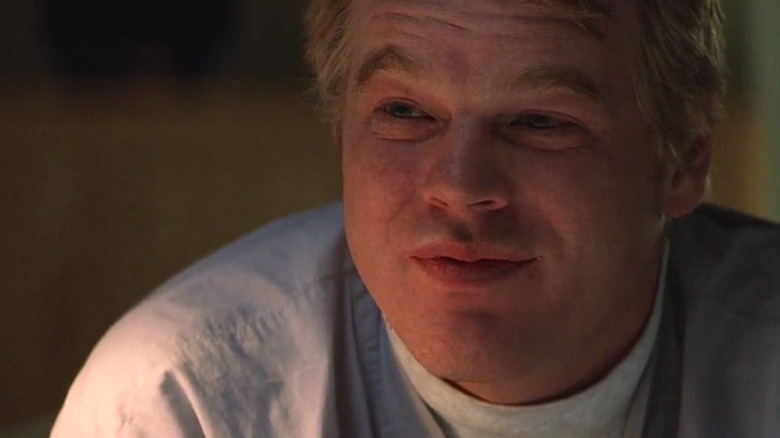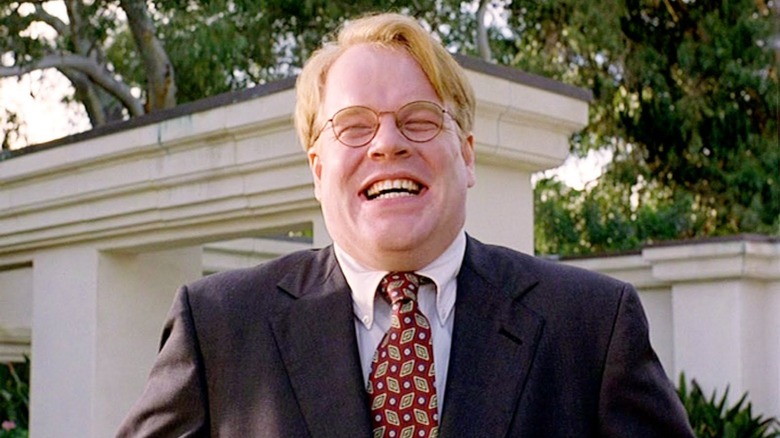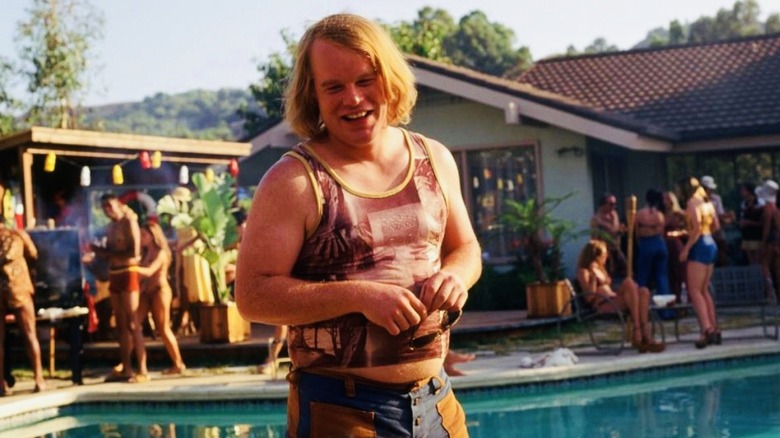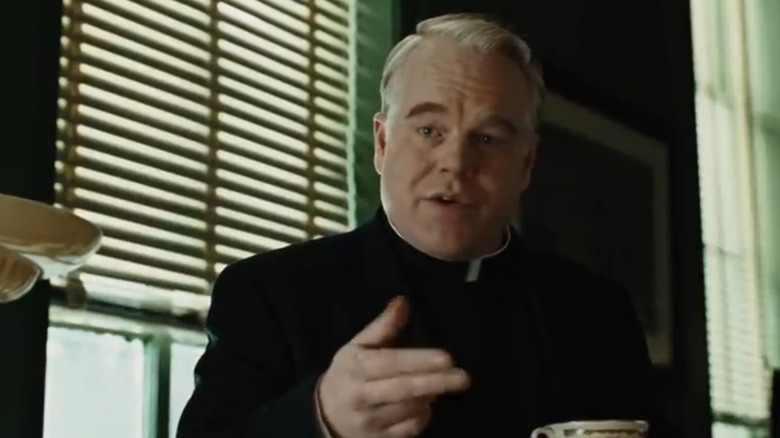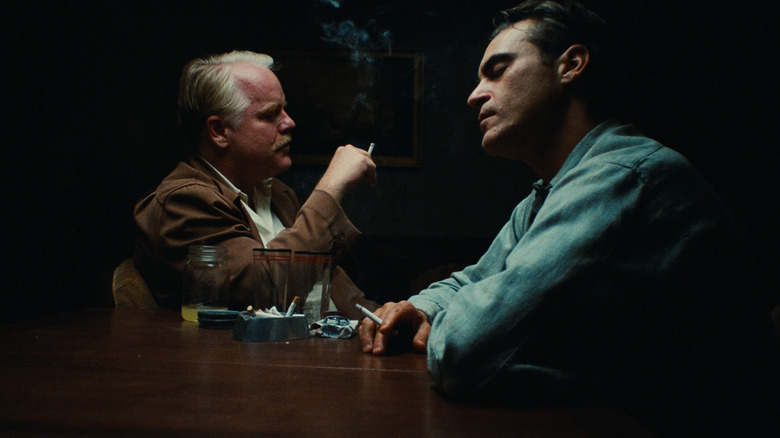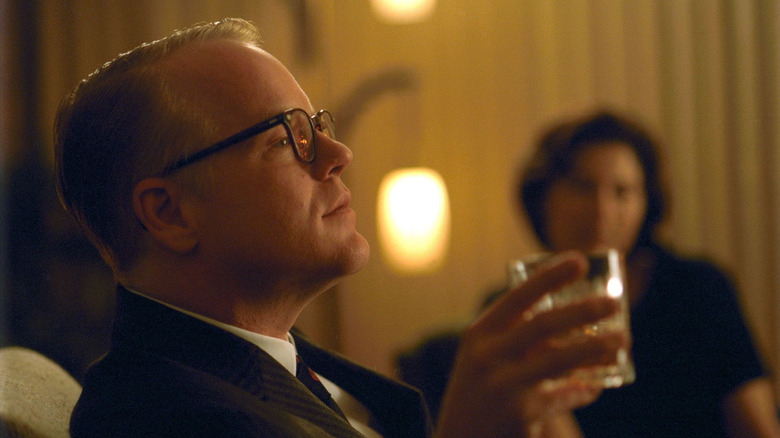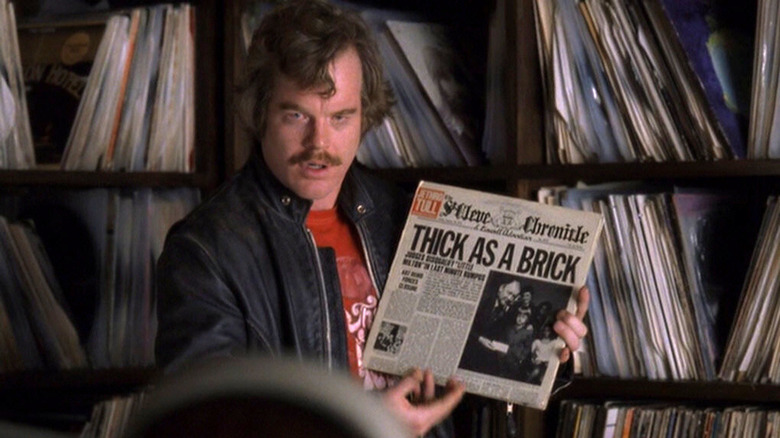The 15 Greatest Philip Seymour Hoffman Movies Ranked
The tragic death of actor Philip Seymour Hoffman in 2014 was a shock to both movie fans and the film industry. As one of the greatest actors of his generation, Hoffman clearly had so much more to give. Hoffman's loss is one the industry and his fellow actors will not soon forget. Years later, the unique actor's absence is still felt. However, Hoffman left behind a rich legacy of classic films and performances that will be cherished and celebrated forever.
Hoffman was unlike any of his contemporaries. He was a true chameleon who could seamlessly slip into any genre and tackle any role. Depending on what the story called for, Hoffman could be funny, charismatic, scary, or cruel. There are great movie stars, and there are great character actors — Hoffman was both.
Hoffman worked in film and on stage up until his death. Although he was best known for being a maverick thespian who appeared in arthouse and independent cinema, mainstream audiences will undoubtedly remember him as Plutarch Heavensbee in the massively popular "Hunger Games" franchise.
Here are the 15 greatest Philip Seymour Hoffman movies, ranked.
15. Cold Mountain
The 2003 Civil War epic "Cold Mountain" is a throwback to a classic era of cinema that combines old-fashioned storytelling with the violence and graphic content that's only possible in modern films. Taking place during the beginning of the Civil War, the story focuses on the community of Cold Mountain, North Carolina, which is galvanized into joining the Confederacy. However, W.P. Inman (Jude Law), a carpenter who has no loyalty to the rebel cause, wants to stay at home to complete his courtship to his lover Ada Monroe (Nicole Kidman).
Inman is forced to fight for three long years and is eventually presumed dead in battle. Making the long journey back to find Ada, he encounters many strange and dangerous figures. Among them is the corrupt religious leader Reverend Solomon Veasey (Philip Seymour Hoffman). Inman stops Veasey from murdering an enslaved girl he's assaulted, and he grows irritated when the preacher insists on joining him in his journey.
14. The Ides of March
George Clooney's 2011 political drama "The Ides of March" is an insightful examination of the behind-the-scenes mechanics of modern politics that depicts the United States presidential election as a fraught and morally challenging event. Clooney stars as the Democratic governor of Pennsylvania Mike Morris, who looks to be closing in on a tight primary victory. Morris' campaign is managed by senior strategist Paul Zara (Philip Seymour Hoffman) and his junior assistant Stephen Meyers (Ryan Gosling).
The campaign grows more complex as Meyers learns secrets about Morris' past that force him to question his loyalties. After the death of Morris' intern, Molly Stearns (Evan Rachel Wood), he considers drastic action. Zara reprimands him in a frank fashion, explaining the cynical practices that they must abide by to have their careers. Zara's rivalry with the opposing campaign manager, Paul Duffy (Paul Giamatti), is engaging. Seeing two of the greatest actors of the 21st century go head-to-head is riveting.
13. Charlie Wilson's War
Aaron Sorkin is a screenwriter who builds his characters to be scene-stealers. Often a minor character in a Sorkin script can single-handedly command the audience's attention with some memorable dialogue. This is exactly what Philip Seymour Hoffman does in the 2007 biographical dramedy "Charlie Wilson's War" — the last film from the great comic director Mike Nichols. The film centers on the eccentric, womanizing U.S. congressman (Tom Hanks) who helped fund the efforts of Afghan rebels to oppose their Soviet oppressors during the 1980s.
Wilson's interests require the cooperation of the CIA, and he has to convince Afghan task force manager Gust Avrakotos (Hoffman) to join him. Gust is looking for a solution to help the rebels, but he can't seem to get funding from the government. He has a deep distrust of politicians, viewing them as corrupt and ignorant regarding the details of wartime intelligence. Gust soon realizes that Wilson isn't a typical bureaucrat — even if his flamboyant personality is an issue on its own.
12. Hard Eight
In the first of their many collaborations, Philip Seymour Hoffman appears in one of the most memorable moments in Paul Thomas Anderson's directorial debut "Hard Eight." The low-budget indie thriller focuses on aging card shark Sydney (Philip Baker Hall), who finds a poor young man named John Finnegan (John C. Reilly) in a diner. Sydney offers to pay for John's mother's funeral and gives him an opportunity to become his protégé and travel to Las Vegas.
As Sydney teaches John about the gambling lifestyle, he proceeds with a calm and confident demeanor. Sydney's feathers are ruffled for the first time when he encounters a particularly obnoxious craps player (Hoffman) who unnerves John with his foul-mouthed insults and overconfidence. Hoffman kicks up the tension in the scene and forces John to question his decision for the first time: Is this what his future will like, and is Sydney the man to guide him?
11. Moneyball
Filmmaker Bennett Miller owes much of his career to Philip Seymour Hoffman. It was through Hoffman's brilliant performance in Miller's narrative feature debut "Capote" (his first film was the 1998 New York tour bus guide documentary "The Cruise") that the director was able to garner the critical acclaim that would inspire interest in his next projects. Miller can take true stories from history and transform the complex subject matter into gripping character studies. With 2011's "Moneyball," he took on the real-life story of the 2002 Oakland A's record-breaking season under the unique strategy of general manager Billy Beane (Brad Pitt).
Beane and his assistant, analyst Peter Brand (Jonah Hill), use mathematical calculations to find lower-ranked players and highlight their abilities to create the perfect winning team. He's considered crazy by skeptics, including Oakland A's athletic manager Art Howe (Hoffman), who doesn't understand the new approach and pushes for a more traditional recruiting process.
10. Before the Devil Knows You're Dead
Philip Seymour Hoffman's characters were not always inherently likable. Still, the risk-taking actor was always able to find something genuine and understandable in their often conflicted motivations. That was a crucial asset when he was tasked with playing characters with a complex relationship with their morality. His role in the great Sidney Lumet's last masterpiece "Before The Devil Knows You're Dead" was one of his most dynamic.
Hoffman stars as Andy Hanson who convinces his brother Hank (Ethan Hawke) to help stage a robbery of their parents' jewelry store. Andy has always lived in his father Charles' (Albert Finney) shadow. He convinces Hank that the crime will be quick and nonviolent. However, the attempted heist goes wrong when their mother (Rosemary Harris) is shot and dies of her injuries. Andy must live with his guilt while making sure that his brother doesn't confess.
9. The Talented Mr. Ripley
Anthony Minghella's "The Talented Mr. Ripley," released in 1999, is a film that could have easily descended into schlocky melodrama, but thanks to Minghella's anxiety-inducing direction and first-rate performances from the film's ensemble, it's an elevated thriller and a gripping character study. Matt Damon stars as the titular Ripley, a young man with obsessive tendencies and the uncanny ability to capture the voice and persona of people he meets. In the film, Tom focuses his attention on the wealthy Dickie Greenleaf (Jude Law).
After impressing Dickie with an impression of his father, Tom is invited to stay at the seaside village of Mongibello with Dickie and his girlfriend Marge Sherwood (Gwyneth Paltrow). Tom's obsession with Dickie grows stronger, and he feels threatened by the appearance of socialite Freddie Miles (Philip Seymour Hoffman). Hoffman immediately kicks up the tension in the story by teasing Dickie and cruelly mocking him. Later in the film, after Dickie's murder, Freddie returns to confront Tom in one of the film's most tense sequences.
8. Punch-Drunk Love
A great actor can transcend minimal screen time and deliver amazing work. Few can look back at Paul Thomas Anderson's classic 2002 romantic comedy "Punch-Drunk Love" and not instantly think of Philip Seymour Hoffman. With its philosophical musings and eccentric non sequiturs, "Punch-Drunk Love" is a unique reinvention of the rom-com. And it was the first film that proved to the world that Adam Sandler could act. Sandler stars as lonely toilet plunger salesman and bachelor Barry Egan.
Barry's life is dominated by his overbearing sisters, but he falls in love with a sensitive woman named Lena Leonard (Emily Watson) and attempts to win her affections. To build his confidence, Barry stands up to the "Mattress Man" Dean Trumbell (Hoffman) over the phone — only to be berated with an increasingly creative (and uproarious) series of insults. Hoffman's unrelenting rage is hilarious compared to Sandler's meek and sensitive performance.
7. Magnolia
Paul Thomas Anderson is renowned for taking risks. "Magnolia," released in 1999, is the most ambitious film he's made so far. A three-hour dramedy, "Magnolia" centers around a group of lonely and troubled characters in the San Fernando Valley as their lives intersect. What could have been a painfully indulgent slog is instead a moving, emotional journey that features stunning work from a great ensemble cast. It's challenging to single out just one performance as the film's best, but Philip Seymour Hoffman is a standout in his understated role.
Hoffman appears as kindly nurse Phil Parma who's tasked with caring for dying television producer Earl Partridge (Jason Robards). Partridge was the former host and developer of the cruel game show "Do Kids Know?" and now watches his estranged son Frank (Tom Cruise) work as a motivational speaker who preaches toxic masculinity. In the film, Phil must get these two to reconnect and work out the demons of their past.
6. The Big Lebowski
The Coen Brothers' utterly original 1998 film "The Big Lebowski" is one of the funniest (and for many, one of the greatest) movies ever made. There's simply nothing like "The Big Lebowski." It's an ingenious mix of philosophical insights, winking ironies, noir movie tropes, eccentric situations, bizarre dialogue, and unique framing. Above all, Jeff Bridges created one of the greatest characters in cinematic history with "The Dude," a good-hearted stoner who just wants to go bowling with his best friends Donny Kerabatsos (Steve Buscemi) and Walter Sobchak (John Goodman).
The film also features side characters that are just as hilarious. Philip Seymour Hoffman appears in one of "The Big Lebowski's" most memorable supporting roles as Brandt, the assistant to the wealthy philanthropist Jeffrey Lebowski (David Huddleston) (whom The Dude is constantly mistaken for). Brandt is completely helpless to the whims of his employer, but he keeps a smile on his face as he attempts to hold it together amidst the stress that The Dude's chaos brings to his workplace.
5. Boogie Nights
One of the reasons that Paul Thomas Anderson's 1997 film "Boogie Nights" remains such a beloved classic is the empathy with which it shows all of its characters, depicting their lives with both hilarity and heartbreak. Few characters represent that dichotomy more than Philip Seymour Hoffman's lowly camera operator Scotty. Anderson treats the adult film industry with an earnestness that is rarely seen. This world is particularly hard for someone like Scotty who doesn't feel quite at home in the community.
Scotty lacks any real confidence and is isolated in his technical position. He's forced to watch the stars interact and maintain the deep friendships that he can't develop himself. Despite his isolation, Scotty yearns for the new young star Dirk Diggler (Mark Wahlberg) and tries to flirt with him during their brief interactions. After finally working up the courage and confronting Dirk about his feelings, Scotty attempts to embrace his crush — only to have Dirk insult him and push him away. Hoffman's spiral into self-hatred is one of the film's most heartbreaking moments.
4. Doubt
One of Philip Seymour Hoffman's great advantages as a film actor was his extensive experience in theatre. Despite some superficial similarities to cinema, the demands of the stage are very different. Theatre requires an actor to maintain a greater level of intimacy. Hoffman's excellence on the stage helped him prepare for one of his best roles in John Patrick Shanley's 2008 film adaptation of "Doubt."
The film centers around a small Catholic community in the Bronx of the 1960s. Hoffman portrays Father Brendan Flynn, a pillar of the tight-knit community. Flynn is popular among his congregation and pushes for a more progressive Church doctrine. However, Flynn's life is turned upside down when elder parish school principal Sister Aloysius Beauvier (Meryl Streep) sees him taking a young African-American boy into his office for a private meeting. She later smells alcohol on the boy's breath. When questioned, Flynn claims that the boy had been caught drinking before basketball practice. Flynn explains that he had reprimanded the boy and offered him private guidance out of fear that he'd be stigmatized by racist insensitivities to a childhood mistake. Beauvier holds on to her suspicions, and with the help of innocent teacher Sister James (Amy Adams), begins to dig deeper. "Doubt" explores the ambiguous nature of truth, faith, and certainty as it delves into the mystery of Flynn's guilt or innocence.
3. The Master
When thinking about the greatest actor-director pairings of all time, it's easy to recall Robert De Niro in Martin Scorsese's films, John Wayne in the works of John Ford, or Humphrey Bogart's collaborations with John Huston. Those are all cases in which major directors took talented, big-name stars and frequently cast them as leads. But neither Philip Seymour Hoffman nor the great Paul Thomas Anderson fits that standard mold of the mainstream. Hoffman was rarely the lead in Anderson's films, but he was an integral part of so many of them. Anderson is renowned for his incredible characters, and few are more memorable than the ones portrayed by Hoffman.
Hoffman's greatest performance in one of Anderson's films was also, sadly, his last. He gave one of his final screen performances in Anderson's modern classic "The Master," released in 2012. Based loosely on the life of Scientology founder L. Ron Hubbard, the film centers on cult leader Lancaster Dodd (Hoffman) who holds private meetings in which he spreads his radical beliefs about the origins of mankind. Dodd takes an interest in troubled World War II veteran Freddie Quell (Joaquin Phoenix) and invites him to join "The Cause," with the promise that he can find relief for his war-induced post-traumatic stress disorder. Slowly, Freddie is indoctrinated into worshiping his new mentor.
2. Capote
It took far too long, but Philip Seymour Hoffman finally won an Academy Award for best actor for his transformation into famed novelist Truman Capote in Bennet Miller's 2005 biographical drama "Capote." In many ways, it's a role that hits all the marks of what an awards-friendly biopic should be. However, "Capote" is far from a typical Oscar-bait vehicle. Miller (who would reunite with Hoffman for 2011's "Moneyball") examines the deeper moral questions prompted by Capote's life. He explores the responsibilities of journalists and questions just how close a writer and their subject should get.
"Capote" follows the author after he comes across a gripping New York Times story about the slaying of the Clutter family in their Kansas home. Intrigued by the tragic story, he immediately calls William Shawn (Bob Balaban), editor of The New Yorker, so he can begin an in-depth investigation of the crime.
He's met with resistance from Kansas Bureau of Investigation detective Alvin Dewey (Chris Cooper) but eventually scores an interview with suspects Perry Smith (Clifton Collins Jr.) and Richard Hickock (Mark Pellegrino). As he documents their story (which will inspire his book "In Cold Blood"), Capote becomes dangerously close to empathizing with the killers. Hoffman brilliantly embodies the author, convincingly adopting Capote's unique vocal patterns and physical appearance.
1. Almost Famous
One of the elements that made Philip Seymour Hoffman such a critical figure in the film industry was his spirit of giving. He was a generous performer — one who welcomed his co-stars onto the screen and gave them room. It's only fitting that his strongest performance was playing a character who is inherently friendly and inviting. "Almost Famous" embodies everything that made Hoffman so special as an actor. As outspoken rock critic Lester Bangs, he plays a supporting yet integral role that instills Cameron Crowe's classic with an immediate tone of optimism that follows through with a gripping emotional moment later on.
The film centers around a slightly fictionalized version of a young Cameron Crowe played by William Miller (Patrick Fugit). Miller is obsessed with music thanks to a bonding experience with his sister Anita (Zooey Deschanel) when he was younger. Unfortunately, William's mother Elaine (Frances McDormand) is strict about what he is exposed to (even refusing to celebrate Christmas out of fear that it's become too commercialized). As William grows up, he finds an outlet for his budding interests through Creem Magazine editor Lester Bangs (Hoffman). Impressed with the young boy's knowledge, Bangs takes William under his wing and begins filling him in on the music history lessons he was denied by his mother. William's goal is to become a music journalist, and Bangs guides him on his journey.
